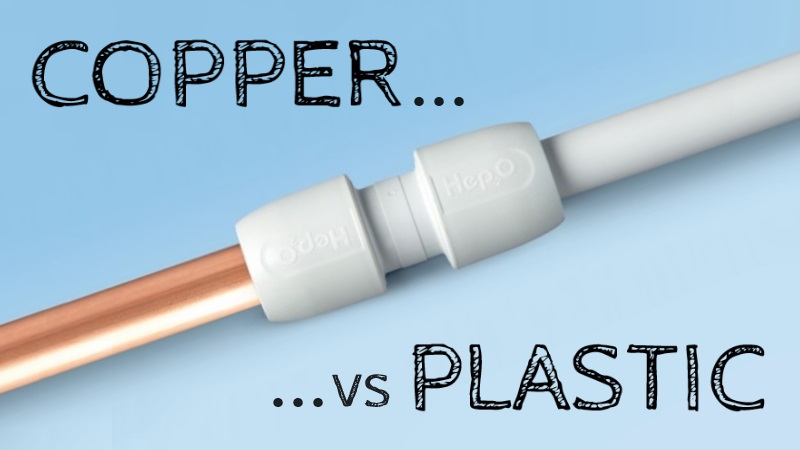When it comes to your plumbing needs, there are many choices to make.
Deciding between plastic pipes or copper water pipes for your build is an important decision to make. Switching materials mid project could mean wasted time and money as you’d have to buy multiple parts and adapters for the various piping materials. Therefore, before you start, you need to decide: copper pipe vs plastic pipe (PVC).
Copper pipes are the traditional form of plumbing pipes. Offering plumbers the flexibility of switching out parts. It was the highly popular choice when it came to pipe insulation. While it’s had a lot of time as a market leader in plumbing installations, is it still the best option for you?
THE PROS
- Durable, copper can last a long time
- Copper can handle the heat without losing strength
- Copper resists corrosion and high water pressure
- Copper is more easily usable outdoor
- Copper has a long history of durability and long term usage
THE CONS
- Copper can be more expensive and less flexible than plastic pipes
- Tap water may taste metallic if not treated with filtering
- Not resistant to sweating (insulation)
- Pipes can burst if water freezes internally
Copper pipes have a long standing history of working well in homes. More popular than other metals thanks to its softer material and flexibility, copper pipes are slightly more resistant to water corrosion than other metallic pipes and is generally more durable whereas plastic pipes are not. Because copper is still metallic in nature, it is a conductor of heat meaning that heat or cooling can get lost as water travels. This also poses a danger to children. If a copper pipe is exposed outdoor (or even indoor) where children can put their hands on it, there is a potential risk of harm. Still, copper pipes have been used throughout time simply because it’s good material that lasts a long time.
PLASTIC PIPES (PVC)
Plastic pipes are growing in popularity thanks to a number of factors, namely flexibility and price. While there are some generalizations that can be made across the different types of material, we’ll be focusing on Polyvinyl chloride (PVC), one of the more commonly used plastic pipes throughout.
THE PROS
- PVC is resistant to many acids and halogens
- PVC can carry hot water if a skilled plumber chooses the correct material
- Simple and faster install options (fast fit connections & pipe flexibility)
- Cheap/lower price point (as compared to copper pipes)
- Low noise emission & faster water flow (less resistance)
- Little to no temperature conduction (heat won’t get lost as water travels)
THE CONS
- Not resistant to solvent
- Choosing the correct PVC pipes for hot water may be tricky to ensure the longevity of the pipe
- Vulnerable to expansion and shrinkage pending the temperature of the liquids
- Shorter pipe life
- Weaker material (may need more support)
- Not ideal for outdoor use (UV light can damage plastic pipes)
- If using under floorboards it could be vulnerable to rodent attack
When trying to decide if copper or plastic water pipes work best for you, there are a few questions you’ll have to ask yourself. Will the pipes be exposed outdoors, face intense heat, face different types of water with inorganic material? Clearly, there are many different pros and cons to copper pipes vs plastic pipes. If in doubt, always ask an experienced professional.
Leave a comment down below, if you have any pros or cons for plastic vs copper piping.


I would say plastic mdpe
My outside water line from the house to the street has a leak and needs replacing. Which material, copper or plastic would be the best to use for this job? It could have tree roots to deal with.
I am so happy when reading on construction tips. It is an opportunity to expand my knowledge.